While I didn’t find 2024 to be quite as compelling as 2023 in terms of television shows, there are numerous new standouts and holdovers who delivered the goods in 2024. With all the shows out there, it’s impossible to see everything. For example, I was late to Ted Lasso, and it still hurts. Any list compiled in any given year when so many media outlets produce so much work must be considered “of the moment.” Here are my best of the moments of 2024.
First, the honorable mentions:
Black Doves (Netflix): A surprise year-end addition to my list. You don’t typically get a terrific series just before year’s end, but this December Netflix spy thriller was a genuine pleasure. Starring Keira Knightley and Ben Whishaw as a spy/assassin duo trying to uncover a conspiracy, Black Doves required no small amount of suspension of disbelief (although no more than an average Bond entry). Still, their deep and unlikely friendship is the show’s core, and that bond is unshakable.
Bad Sisters (Apple TV+): A slight step down from the marvelous season one, Bad Sisters still sustains as one of the best shows on television due to the excellent chemistry between the Garvey Sisters. While it still feels that a “one and done” limited series would have been the best result for qualitative purposes, too much of a good thing is still a good thing.
True Detective: Night Country (HBO): Largely a return to form for the HBO anthology series, the only thing that harmed the show is that it felt a bit short at just six episodes. However, there can be no denying the fractious chemistry between Jodie Foster’s Alaskan sheriff and Kali Reis’s local cop trying to resolve a bizarre mystery with supernatural undertones.
Disclaimer (Apple TV+): An enthralling set-up by the great Alfonso Cuaron unravels a bit down the stretch, as a late-breaking plot twist doesn’t quite hold up and feels unfairly rendered to the audience. Even so, this steamy and pulpy revenge thriller starring the great Cate Blanchett, a best-in-ages Kevin Kline, and a far-against-type Sacha Baron Cohen is still worthy of mention.
This is Zodiac Speaking (Netflix): An unusually well-made true-crime docuseries from a network that can pump them out at a rate that is too high to maintain quality. This is Zodiac Speaking can stand alone on its own merits but also makes for an excellent companion with Zodiac David Fincher’s sterling 2007 narrative film on the same subject. The series blends in footage from the film that enhances both works.
The Penguin (HBO): Intended as connective tissue backstory for Matt Reeves, The Batman and its forthcoming sequel, The Penguin, is full-on R-rated pulp. The HBO series is far better than it needed to be in every respect, but it would be hard-pressed to make my list of honorable mentions without the stunning disappearing act of a performance by Colin Farrell. Considering what a classic film The Elephant Man is, it might be hard to think of this way, but I can’t think of another more effective performance buried under so much makeup since John Hurt Played John Merrick for David Lynch.
The Greatest Night in Pop (Netflix): Certainly a nostalgic entry, but being alive at the time of the release of “We Are The World” and seeing all those artists from that era come together for one overnight recording session to produce the biggest benefit record ever was an impossibly enjoyable watch. It’s very well-made, and the “Will Prince show up” intrigue held drama, even if you already knew the outcome. The Greatest Night in Pop is also a fine late-in-life tribute to the song’s producer Quincy Jones, who may have walked out of the session with one of the most maudlin, truly awful songs of the ‘80s (no small feat), the fact that he came up with anything usable at all is extraordinary.
Now, onto the Top Ten:
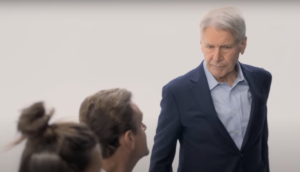
10…Shrinking (Apple TV+): While season two of Shrinking, starring Jason Segel as a grieving therapist, didn’t get out of the gate quite as quickly as season one, it certainly delivered by the final episode. Show creator Brett Goldstein elevates every scene he’s in as the guilt-ridden cause of Segel’s pain. Wendie Malick’s relationship with Harrison Ford brings out a vulnerability in the icon I’ve seldom seen. People blink when I say this, but I’m sticking to it: this is Ford’s best role since Working Girl in 1986. The show’s center remains the recovery from grief and disappointment between a father and his daughter (Segel and Lukita Maxwell). The show’s ability to juggle the rhythms of comedy and sadness is remarkable, and again, it’s just amazing to see Ford hit this late-career peak.
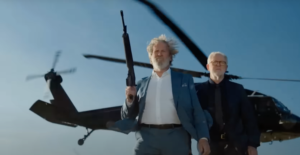
9…The Old Man (FX): Despite pulling off a stunning season 2, The Old Man was canceled just as it reached new heights. Jeff Bridges and John Lithgow make a great two-man team in the early going, and episode five, set in Lithgow’s flooding house, is a spectacular display of minimalism and acting as the two men find themselves helpless to support a woman they both see as their daughter. The use of California locations to create Afghanistan at the beginning, the play-like episode five, and the thrilling self-rescue performed by Amy Brenneman down the homestretch showcased how well this series could manage tone and location. Season one was terrific. Season two was even better. Alas, there will be no more despite there being much more to tell.
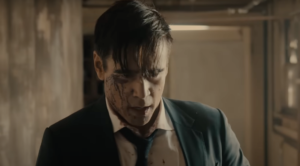
8…Sugar (Apple TV+): Sugar starts out as a mysterious neo-noir series that references (and even inserts) sequences from the most renowned film noirs in cinematic history, then takes a sudden left turn late in the game and becomes a grounded sci-fi/noir mixture with some The Man Who Fell to Earth undertones. The revealing scene is a true stunner when we realize what we’ve been watching is much more than we might have thought it to be. A leap of this sort only works if it’s set up well with clues that range from the subtle to the “Wait a minute, did I just see that?” The show’s creator (Mark Protosevich) manages those secrets and that shift with the help of directors Fernando Merielles and Adam Arkin, but the real key to this sleight of hand is another tremendous performance by Colin Farrell. It might be hard to think of it now, but the one-time bad boy A-lister, who seemed destined for the scrap heap, has become one of the finest actors currently working. Farrell’s long-simmering comeback was completed after his extraordinary 2022 (Banshees of Inisherin, The Batman, After Yang, and Thirteen Lives). The Penguin and Sugar have extended his winning streak. Sugar will be back for season two. I hope it gets a little more respect from critics and envelope-opening ceremonies going forward.
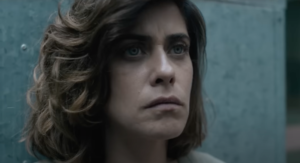
7…The Asunta Case (Netflix): Based on actual events, The Asunta Case is a first-rate procedural covering the search for a missing 12-year-old girl by two detectives in Santiago de Compostela, Spain. The case was a grim sensation in Spain, but the studied, rigorous approach of the series and the two investigators (played by Maria Leon and Carlos Blanco) avoid taking the obvious approach while still recognizing the media coverage and the relentless hype. Leon and Blanco’s detectives are only interested in the truth, and they have the bags under their eyes to show for it. It’s rare to see a true-crime-based narrative series (or docuseries, for that matter) take the time to be fair and unflinching in the telling of such a landmark investigation, but The Asunta Case just does just that, and the results are outstanding.
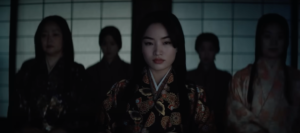
6…Shogun (FX): Superior in nearly every way to the much beloved 1980 miniseries starring Richard Chamberlain, Shogun was the best new non-limited series from the last year. The cast, headed by the incomparable Anna Sawai and Hiroyuki Sanada, is almost entirely aces, as this version of Shogun focuses more on the Japanese characters than the ‘80 miniseries did. The one slight demerit I would give the show is Cosmo Jarvis, who plays Richard Chamberlain’s British character this time around. It’s not that Jarvis is terrible; it’s that in an ensemble doing near-peerless work, he is the least among equals. Even so, one does either warm to him or, in my case, get used to him as the season progresses. The unavoidable absence of one notable character in the already-announced season two is a bit of a red flag in terms of how strong a follow-up season can be. Still, for now, Shogun is an outstanding and definitive retelling of James Clavelle’s novel.
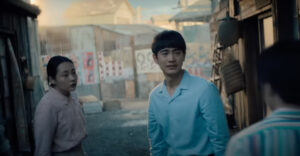
5…Pachinko (Apple TV+): The most undervalued show on television. Creator Soo Hugh’s Pachinko struck me as a complete limited series when it ended its first season. I was almost disappointed when a second season was announced. How would they come close to matching such a brilliant first season, which jumped between two generations and ended so perfectly? O, ye of little faith. Hugh, almost miraculously, builds upon the story of Korean immigrants trying to make their way through the obstacles of assimilation only to get caught up in the Second World War. The ensemble cast led by Minha Kim, Lee Min-ho, Jin Ha, Youn Yuh-jung, Jimmi Simpson, and Anna Sawai (whose role becomes pivotal in season two) is masterful in bridging the space between war-torn Japan and the near modern day. It must be said, though, that the unexpected heart of this season was the journey of Sunja’s son Noa (Kim Kang-hoon), as the unveiling of a secret unmoors the young man just as he is finding his way through his first year at university. This time around, at the end of the final episode, I feel much differently than when season one closed. More, please.
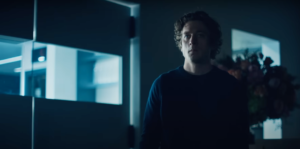
4…The Bear (FX): Yes, I know, The Bear season three was not as strong as its first season or its (likely) incomparable second season. Still, the almost wordless episode one was a master lesson in marrying the visual to sound as it filled in numerous blanks in Carmy’s (Jeremy Allen White) traumatic past with his family and learning under a viper-like master chef. Sure, some comparative dips in season three weren’t experienced in the prior two seasons, and I do feel like three is a transitional sort of season that is likely to elevate season four (which was shot concurrently with three) and the series as a whole. The final episode features Olivia Colman’s chef making bad food in an apartment after closing down her four-star restaurant and Sydney’s near panic attack over the dilemma of whether to continue with Carmy or go her own way with a new opportunity does a fine job of closing out one chapter while perfectly setting us up for another.
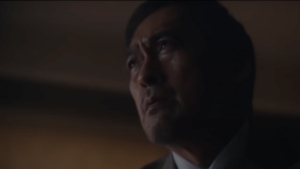
3…Tokyo Vice (MAX): Season 2 of this startling mixture of culture clash, journalism, police corruption, and the Japanese mafia (the Yakuza) was, unfortunately, its last. MAX chose not to renew, and the show’s producers could not find a new home for a third season. Still, Tokyo Vice accomplished much over two seasons. It gave Ansel Elgort his best role ever, playing the real-life (gaijin – foreigner) Jake Adelstein, who moves from Missouri and becomes the first non-Asian reporter in the history of the largest newspaper in Japan. Elgort is exceedingly well supported by Rinko Kikuchi as his boss, Rachel Keller as a club owner trying to navigate a perilous deal with the Yakuza, Sho Kasamatsu as a reluctant Yakuza, and Shun Sagata as a Yakuza leader. Most importantly, though, is that he is equaled by the reliably excellent Ken Watanabe as a police officer who helps Jake navigate the crime scene in Tokyo, and in doing so, his Katagiri and Ansel’s Jake become unlikely friends. The final scene of the series at Katagiri’s home, between him and Jake on a porch, somehow manages the impossible: putting the perfect ending on a show that deserved to never end.
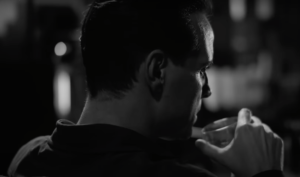
2…Ripley (Netflix): Steven Zaillian’s masterful, reduced-to-bare-bones version of Patricia Highsmith’s novel “The Talented Mr. Ripley” showcases a spellbinding Andrew Scott in the lead role and shows how a familiar story can be reenvisioned in stellar fashion when the talent involved know just what they are doing. Shot in silky black and white and reducing the supporting characters down to their very basics, Ripley (unlike Anthony Minghella’s lustrous 1999 film starring Matt Damon) keeps the focus squarely on its subject: a sociopathic grifter with no conscience. Making extraordinary use of Italian locations and the dread that comes with silence, Ripley is gorgeous to look at, even when being deeply unnerving. The series’ visual peak occurs at sea as Scott’s Ripley takes a late-night view of the waves splashing against the ship and looks like nothing less than a vampire coming out for a pitch-black stroll and pondering who might be his next victim.
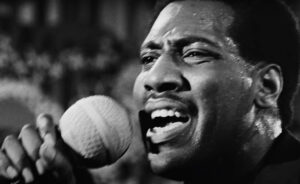
1…STAX/Soulsville (MAX): Directed by Jamila Wignot, telling the story of one of the greatest record labels of the ‘60 and ‘70s is not only an immersive musical experience but a uniquely political and historical one, too. STAX was the grittier, southern answer to Motown, with artists like Otis Redding, Carla Thomas, Isaac Hayes, Booker T. and the MGs, Sam and Dave, The Staples Singers, and many others. The series transcends the typical musical docuseries by intertwining the Civil Rights movement, segregation, Jim Crow, and Martin Luther King in a remarkable stew of glorious music and an invaluable history lesson. There’s no getting around the crushing undermining of STAX due to a disastrous distribution deal with the major label CBS Records; this long moment in Memphis time is the best, most fulsome series I saw all year, hence its position in my rankings. Hell, it would have made my top ten just for the behind-the-scenes footage of Otis Redding and band playfully working through his ditty “Fa-Fa-Fa-Fa-Fa (Sad Song)” in a living room. In a series full of revelatory moments, just hearing and seeing Otis sing with joy was, well, joyous.










Disclaimer, Yes!
Glad to see it here and if you'd permit me, I might add that the late-breaking plot twist actually works wonders and puts US the viewers on the hot seat as those who believed / quickly judged whatever sensational / pulpy thing was fed to us (Which many viewers didn't like / feel comfortable with).
Also next to mentioned superb performances, the cinematography of the mini-series was truly sublime.